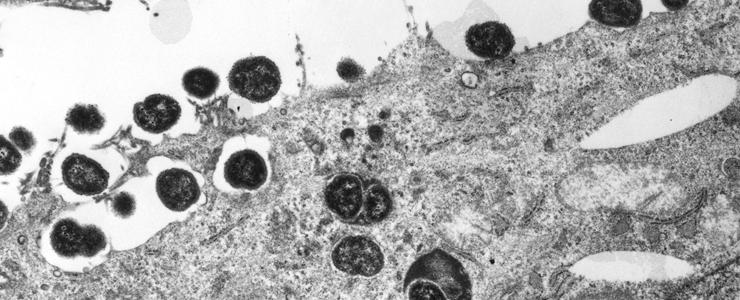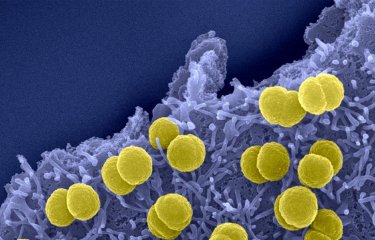A study from the University of Würzburg (Germany) and the Institut Pasteur (France) elucidates the mechanisms of the emergence of an outbreak of meningococcal disease in men who have sex with men (MSM). These results are published in the open access journal PLOS ONE.

Neisseria meningitidis during adhesion and invasion of epithelial cells. © Institut Pasteur
Meningococcal disease usually affects children and adolescents and causes sepsis and meningitis. An international outbreak was observed among MSM in 2013 in the US and Europe. Vaccine recommendations were launched to protect people at risk in France, Germany, and the USA.
The new study brought together molecular microbiologists at the National Center for Meningococci at the Institut Pasteur (France) and the Universities of Würzburg, Münster, and Greifswald (Germany), as well as epidemiologists at the Robert Koch Institute (Germany) and The Institut de veille sanitaire (France). The researchers studied the whole genomes of the strains isolated during this outbreak and compared the complete set of proteins they expressed to those found in isolates from other patients. The teams showed that the outbreaks in Germany and France were caused by a variant of meningococci that evolved only recently.
“The emergence of this strain shows that meningococci are extremely flexible and vary rapidly change their phenotype allowing efficient adaptation to new conditions” said Ulrich Vogel head of the Reference laboratory for meningococci at the University of Würzburg.
This new variant displayed specific modifications that allowed growth without oxygen. This is an ability consistently found in gonococci, but rarely encountered among meningococci. This finding raised the hypothesis that the new variant adapted its route of transmission to both respiratory droplet – the conventional route of transmission of meningococci - and urogenital transmission. “Although case reports of urogenital infections have been published on several occasions, we provide a mechanistic hypothesis as to how adaptation to the urogenital niche may have developed” Muhamed-Kheir Taha, head of the National Center for meningococci at the Institut Pasteur, explained.
Moreover, the researchers had previously observed isolated urogenital infections of closely related strains on rare occasions. However, the new strain obviously enhanced its ability to multiply in the bloodstream, and thus displayed increased virulence in comparison to the urogenital isolates.
The detailed reconstruction of the evolutionary mechanisms underlying this prominent meningococcal disease outbreak demonstrates the versatility of meningococci and that ongoing surveillance of the disease is essential for flexible adaptation of vaccination strategies.
Source
Evolutionary events associated with an outbreak of meningococcal disease in men who have sex with men, PLOS ONE, 11 mai 2016
Muhamed-Kheir Taha1*, Heike Claus2†, Martin Lappann2†, Frédéric J. Veyrier 1†¥ , Andreas Otto3†, Dörte Becher3, Ala-Eddine Deghmane1, Matthias Frosch2, Wiebke Hellenbrand4, Eva Hong1, Isabelle Parent du Châtelet5, Karola Prior6, Dag Harmsen6, Ulrich Vogel2*
1 Institut Pasteur, Invasive Bacterial Infections Unit and National Reference Center for meningococci, Paris, France
2 University of Würzburg, Institute for Hygiene and Microbiology, Reference laboratory for meningococci and Haemophilus influenzae, Würzburg, Germany
3 Ernst-Moritz-Arndt-University, Department of Microbial Proteomics and Mass Spectrometry, Greifswald, Germany
4 Robert Koch Institute, Immunization Unit, Berlin, Germany
5 Institut de Veille Sanitaire, Saint Maurice, France
6 University of Münster, Department of Periodontology, Münster, Germany
* corresponding authors
†These authors contributed equally to this work.
Contacts
University of Wüezburg Press Office
http://www.presse.uni-wuerzburg.de/kontakt8/
Institut Pasteur Press Office
Marion Doucet – presse@pasteur.fr – +33 1 45 68 89 28
Myriam Rebeyrotte – presse@pasteur.fr – +33 1 45 68 81 01





